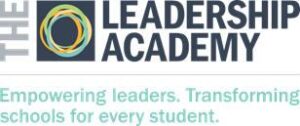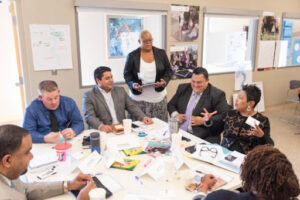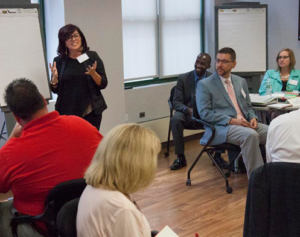 The Leadership Academy builds the capacity of educational leaders at every level of the school system to disrupt systemic inequities and create the conditions necessary for all students to thrive.
The Leadership Academy builds the capacity of educational leaders at every level of the school system to disrupt systemic inequities and create the conditions necessary for all students to thrive.
Vision
Our vision is for all children of every race, ethnicity, and other identity characteristics to have what they need to achieve academic, social, and emotional success The Leadership Academy builds the capacity of educational leaders at every level of the school system to disrupt systemic inequities and create the conditions necessary for all students to thrive. We have found, and research confirms, that leaders are essential for pushing forward the work of disrupting inequities and transforming learning for every student. Specifically, we support and develop leaders to be culturally responsive, to recognize the impact of institutionalized racism on their own lives and the lives of the students and families with whom they work and to embrace their role in mitigating, disrupting, and dismantling systemic oppression.
“Equity” is used all the time in education, but what does that mean, what does it look like to truly lead schools and school systems in ways that disrupt systemic barriers, racist structures, and create learning experiences intentionally built to meet the needs of every child.
 Fort Worth, TX Leadership Workshop
Fort Worth, TX Leadership Workshop
History
The Leadership Academy is a nationally recognized nonprofit organization. Started in 2003 as The NYC Leadership Academy with its groundbreaking, research-based Aspiring Principals Program, trained close to 600 principals, most of them women and leaders of color, who had served in some of New York City’s schools most in need of support and change. Seeing our initial success in New York City, school systems across the country began approaching us to help them develop leadership pipelines and strengthen leader practices.
Over the years, The Leadership Academy has sharpenedits focus on the “how” of dismantling systemic inequities in schools: culturally responsive leadership. To date they have supported 8,000 leaders in more than 200 school systems and educational organizations across 37 states and Washington, D.C. The organization supports aspiring principals, principals, principal supervisors, superintendents and other district leaders, and state education leaders.
In September 2020, The NYC Leadership Academy changed its name to The Leadership Academy. Says President & CEO Dr. Nancy Gutiérrez about the name change, “While we value and cherish our New York City roots, our vision is for all children of every race, ethnicity, and other identity characteristics to have what they need to achieve academic, social, and emotional success. We are reinforcing our commitment to building the capacity of education leaders within their context in communities across the country as a way to support real sustainable change for children.”
 Nancy Gutierrez, The Leadership Academy CEO, with students
Nancy Gutierrez, The Leadership Academy CEO, with students
Activities
The Leadership Academy offers workshops and professional learning opportunities that bring together education leaders from across the country to create learning communities for leaders at different levels of the school system. They customize learning opportunities for school and school system teams to identify and address the needs in their context. They also provide one-on-one and team coaching for school leaders and executive coaching for school system leaders.
Examples of Outreach:
We need a new kind of education system — an equitable, culturally responsive system.
The Leadership Academy defined “culturally responsive leadership” as ensuring that every child and adult in a school community has what they need within an environment intentionally built for them to achieve academic, social and emotional success, regardless of race, ethnicity, language or other characteristics of their identity. Achieving this requires flipping current systems and structures on their heads. Consider what this could look like, as The Leadership Academy recently wrote in The74:
-
- Rather than staff police in schools, increase counselor teams and other supports to meet students’ needs.
- Rather than use a stock curriculum, devise one that is more student-directed.
- Rather than track students, determine how they can work at their own pace, whether they are in school or learning remotely.
- Rather than rely on standardized tests, give students assignments that create opportunities to develop and showcase the skills they need after high school, like critical thinking, creativity and problem-solving.
- Rather than follow the farmers’ calendar, consider schedules that better align with family work schedules and students’ social and emotional needs.
- Rather than rely on school boundaries that promote segregation, create policies that desegregate schools, such as by redrawing district lines or separating students’ school assignments from their neighborhoods.
- Rather than use school board elections that favor candidates with resources, reimagine how board members are selected to ensure that they reflect the demographics of the students they are serving.
We need a new kind of education leader — a culturally responsive leader.
“Making these kinds of systemic changes requires leaders who recognize the impact of institutionalized racism and embrace their role in mitigating, disrupting and dismantling systemic oppression,” CEO Nancy Gutiérrez and Chief Access & Equity Officer Mary Rice-Boothe wrote in The74. “Leaders like this must first work on themselves by reflecting on their biases and beliefs. Only then can they move to publicly modeling belief systems grounded in equity; being responsive to, and inclusive of, student and staff cultural identities when making decisions; confronting and changing institutional biases that marginalize students; and finally, creating systems and structures that promote equity, particularly for traditionally marginalized students.”
To provide education leaders with new insight into the work of culturally responsive leadership, The Leadership Academy has released “Culturally Responsive Leadership: A Framework for School and School System Leaders,” a unique and innovative research-based set ofactions that weave culturally responsive actions across all levels of leadership from aspiring principals to superintendents.
This framework revolves around eight critical action areas which underlie all of The Leadership Academy’s work:
-
- Equity and Access
- Mission, Vision, and Core Values
- Instruction
- Adult Learning and Development
- Operations and Resources
- Personal Learning and Development
- Strategic Change and Continuous Improvement
- Community Care and Engagement
 Nancy Gutierrez, The Leadership Academy CEO, consults with principals
Nancy Gutierrez, The Leadership Academy CEO, consults with principals
The Leadership Academy’s consulting work may include some combination of the following supports:
-
- Equity Audit: This process enables school systems to diagnose the current state of equity (including examining the impact of COVID-19) and identify focal points and recommended strategies for making improvements. Stakeholder
- Stakeholder Engagement: A process of generating feedback from a wide range of stakeholders to inform the creation of the strategic plan and to surface issues and key needs that should to be considered in the development of the plan.
- Facilitating Strategic Plan Creation: A series of sessions led by our expert facilitators that are informed by the results of the stakeholder engagement and the design thinking process: understanding the needs of those affected by the strategic plan; defining those needs and the problems they are currently facing; creating ideas and solutions to address those needs and problems; and testing those solutions.
- Creation of a Professional Learning Plan: A complementary plan to ensure that system-level staff receive the leadership development support they need to execute the strategic plan at a high level
- Ongoing Equity Plan Implementation Support: Customized support for system leadership teams to pilot specific high-leverage solutions in their district and to review lessons learned and modify their approaches as necessary.
 West Michigan Leadership Academy
West Michigan Leadership Academy
Audience/s served
Working with school systems, The Leadership Academy supports and develops leaders within the context of their communities and takes a systemic approach to addressing local leadership needs. Leaders they support include aspiring principals, principals, principal supervisors, superintendents and other district-level leaders, and state education leaders. Since its founding in 2003, The Leadership Academy has supported more than 8,000 leaders in 210 school systems across 37 states, who collectively reach more than 7 million students.
To consistently provide each student access to the learning opportunities they need to excel, schools need strong culturally responsive leaders. The Leadership Academy defines culturally responsive leadership as being able to recognize how institutionalized racism affects one’s own life and the lives of the students and families one works with, and embracing the important role in mitigating, disrupting and dismantling systemic oppression.
Culturally responsive leaders focus on academic success, cultural competence, and developing students’ and educators’ abilities to think critically about the world around them. They create learning experiences intentionally built to meet the needs of every child. Being culturally responsive is the work at the heart of making school systems more equitable. We support school and school system leaders in using an equity lens to implement a vision, build strong school and district culture, set clear and high expectations, and develop and lead principals and teachers who ensure rigorous and culturally responsive instruction and the opportunity for all students to be successful.
Successful impact
Since our founding in 2003, we have supported more than 8,000 leaders in 210 school systems across 37 states, who reach more than 7 million students. Our partners report high levels of satisfaction in their work with us. After completing work with us, 96% of participants expressed interest in attending future sessions with The Leadership Academy; 94% of participants said the learning they engaged in developed their equity leadership skills; and more than 90% said they would recommend our work to a colleague. Read more about the impact of our partnerships with school and school system leaders in our 2020 Accomplishments Report.
Example:
The Leadership Academy began working with Des Moines Public Schools, Iowa’s largest school district, in 2018 and has supported 71 associate principals and a dozen directors of activity and equity, helping them develop their culturally responsive leadership through equity-focused instructional walkthroughs and coaching in schools. They are strengthening their own coaching skills, learning to help principals give effective feedback to teachers and leading teams committed to dismantling inequities in classrooms and across schools. The Leadership Academy supported district leaders in developing and holding a series of virtual town halls to gather community member, staff, and student feedback on racism in the school district. The district immediately used feedback to create new positions to support school leaders of color across the district and create teams and accountability structures to move the next steps forward.
Recommendations for replication and/or adaptation
As part of our effort to expand our reach to as many leaders as possible, we have a number of resources and tools that we offer for free.
-
- Equity leadership dispositions: This research-based framework of mindsets and behaviors undergird all of The Leadership Academy’s work, outlining what they have found leaders need to know and be able to do to identify and dismantle inequities in their schools and systems.
- Culturally Responsive Leadership Framework outlines the actions and strategies leaders at all levels can use to lead culturally responsive schools and school systems. The framework is organized around eight critical areas of education leadership, from instruction to operations, and includes actions specific for aspiring principals, school leaders, principal supervisors, and superintendents.
- Portrait of a Culturally Responsive School: School leaders and their teams can use this guide to develop practices, policies and structures that will help school leaders and their school communities in consciously disrupting systemic racism and decentering dominant culture in order to accelerate learning for every student.
- Culturally Responsive Remote Observation Guide (walkthrough tool): School leaders and principal supervisors can use this to observe both in-person and remote classroom instruction.
- ABCs of Equity: This dictionary of equity-focused terms is meant to support leaders and their teams in establishing a common language for their work.
- Equity at Work: This tool supports district leaders with an equity-focused strategic planning process.
- The Visionaries Documentary Program takes viewers inside two very different school districts to see up close how education leaders and teachers are creating culturally responsive school cultures and learning environments in partnership with The Leadership Academy.
- The Leadership Academy webinar featuring Dr. Nancy Gutierrez, Education Trust CEO John B. King Jr., former Denver Superintendent Susana Cordova, and Chief Access and Equity Officer Mary Rice-Boothe talking about culturally responsive leadership in K-12 education.
Contact
www.leadershipacademy.org
Jill Grossman, 347-558-6464, jgrossman@leadershipacademy.org
